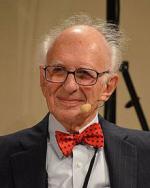Disable ads!
Eric Kandel
Eric Kandel Kandel at the World Economic Forum Annual Meeting in Davos, 2013 Born Eric Richard Kandel (1929-11-07) November 7, 1929 (age 85) Vienna, Austria Fields Psychiatry and neuroscience Institutions Columbia University College of Physicians and Surgeons Alma mater New York University Medical School Harvard University Notable students Richard Scheller Known for Physiology of memory Notable awards Dickson Prize (1983) Lasker Award (1983) National Medal of Science (1988) Harvey Prize (1993) Wolf Prize in Medicine (1999) Nobel Prize in Physiology or Medicine (2000) Spouse Denise Bystryn (m. 1956) Children 2 Eric Richard Kandel (German: [ˈkandəl]; born November 7, 1929) is an American neuropsychiatrist. He was a recipient of the 2000 Nobel Prize in Physiology or Medicine for his research on the physiological basis of memory storage in neurons. He shared the prize with Arvid Carlsson and Paul Greengard. Kandel, who had studied psychoanalysis, wanted to understand how memory works. His mentor, Harry Grundfest, said, “If you want to understand the brain you’re going to have to take a reductionist approach, one cell at a time.” So Kandel studied the neural system of the sea slug Aplysia californica, which has large nerve cells amenable to experimental manipulation and is a member of the simplest group of animals known to be capable of learning. Kandel is a professor of biochemistry and biophysics at the College of Physicians and Surgeons at Columbia University. He is a Senior Investigator in the Howard Hughes Medical Institute. He was also the founding director of the Center for Neurobiology and Behavior, which is now the Department of Neuroscience at Columbia University. Kandel's popularized account chronicling his life and research, In Search of Memory: The Emergence of a New Science of Mind, was awarded the 2006 Los Angeles Times Book Award for Science and Technology.
 Read more on wikipedia.org Read more on wikipedia.org
 All quotes by Eric Kandel All quotes by Eric Kandel
 Edit Edit
|

|
|
|
|
|
Background photo by Giuliana
|